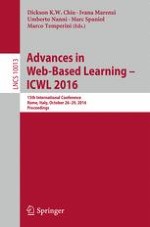2016 | Book
Advances in Web-Based Learning – ICWL 2016
15th International Conference, Rome, Italy, October 26–29, 2016, Proceedings
Editors: Dickson K.W. Chiu, Ivana Marenzi, Umberto Nanni, Marc Spaniol, Marco Temperini
Publisher: Springer International Publishing
Book Series : Lecture Notes in Computer Science
